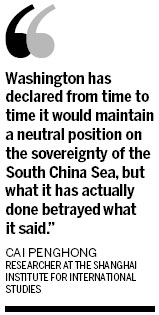ASEAN relations focused on cooperation
China should ratchet up cooperation with Association of Southeast Asian Nations countries to expand Beijing's regional influence while countering Washington's Asia-Pacific pivot strategy, analysts said on Tuesday ahead of a US-Philippine military exercise in the South China Sea.
The essence of China-ASEAN relations is cooperation rather than island disputes, said Zhang Mingliang, a researcher of Southeast Asian studies at Jinan University in Guangdong province.
"China should increase investment, both in quantity and quality, among the ASEAN economies, because the region closely relies on China's economic vitality," Zhang said.
The Philippine-US Amphibious Landing Exercises are scheduled to start on Wednesday at a naval base in Zambales on the western coast of Luzon island facing the South China Sea.
The location is about 220 km from China's Huangyan Island, a group of rocky outcrops whose sovereignty has been illegally claimed by Manila.
"The Chinese will view these military exercises as yet another example of the Philippines stirring up tensions in the South China Sea and of the US taking advantage of the situation to increase its military presence," Ian Storey, a senior fellow at the Institute of Southeast Asian Studies in Singapore, was quoted by AFP as saying.
"For the Philippines, the dispute will continue to be 'the central driver' of efforts to intensify its alliance with the US," Storey added.

The annual exercises, involving 2,300 marines from both sides and showcasing fast-growing military ties, also come three weeks before US President Barack Obama's slated visit to Manila.
Obama will embark on his weeklong trip to four Southeast Asian countries - Indonesia, Brunei, Malaysia and the Philippines - on Oct 6. It will be his first trip to Manila since taking office in 2009.
Manila said the two sides will discuss ways to further strengthen the enduring Philippines-US alliance, including the expansion of security, economic and people-to-people ties, according to Philippine presidential spokesman Edwin Lacierda.
"As traditional allies, Washington and Manila have kept close political and military contacts for years," Zhang said.
Cai Penghong, a researcher at the Shanghai Institute for International Studies, said the US should be neutral and stop meddling in island disputes in the South China Sea.
"Washington has declared from time to time it would maintain a neutral position on the sovereignty of the South China Sea, but what it has actually done betrayed what it said," Cai said.
Obama is expected to attend a series of summits during the trip, including the APEC Summit in Bali, Indonesia and the US-ASEAN Summit and the East Asia Summit in Brunei. The White House said he will discuss cooperation with leaders of Asia-Pacific countries in areas of energy, maritime security, investment and trade.
Zhang said the frequent presence of officials from the Obama administration in Southeast Asia has demonstrated Washington's intention to further interact with regional stakeholders and to increase investment in the area.
"The logic behind it is simply to offset China's growing influence," he said.
"To some extent, it is true that China and the US have been competing for their own spheres of influence among ASEAN states, but the development of ASEAN in general also requires cooperation between the two countries, not a zero-sum power game," he added.
AFP contributed to this story.
puzhendong@chinadaily.com.cn
(China Daily 09/18/2013 page11)














